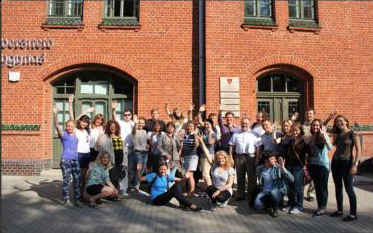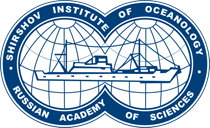
The Department of Ocean Geography was established in 1971 at Kaliningrad State University (now Immanuel Kant Baltic Federal University) on the initiative of the famous polar explorer, Doctor of Geological and Mineralogical Sciences, Professor M.M. Ermolaev.
In April 2013, thanks to a joint initiative of the Kant Baltic Federal University and the Atlantic Branch of the IO RAS (AB IO RAS), the department acquired the status of a basic university department at the academic research institute (cooperation agreement dated 04.04.2013).
The scientific direction "Geography of the ocean" was formed as an independent branch of geographical science in the second half of the twentieth century. Ocean geography deals with the study of the spatial structure and basic physical properties of the ocean as a single natural system, on the one hand, and as part of a more general planetary system - the biosphere - on the other hand. Its tasks include revealing the relationship between the nature of the ocean and the continents, large-scale connections between the oceanosphere and the rest of the elements of the geographic envelope of the Earth, the processes of energy and mass transfer between them, and other phenomena. Ocean geography solves these problems jointly with other sciences, and first of all with oceanology and geoecology. Ocean geography considers the synthesis of knowledge about the ocean as a single natural complex.
The head of the Department of Ocean Geography is DSc (Physical and Mathematical Sciences), Professor, Leading Researcher of the Marine Physics Laboratory of the AB IO RAS Vladimir Alekseevich Gritsenko. His scientific activity is connected with the study of the dynamics of the density-stratified currents of the World Ocean, the variability of its fine structure and the dynamics of a stratified fluid; two effective models of the dynamics of a fluid with a nonuniform density were developed, which were subsequently used in the study of the phenomenon of near-bottom gravity currents in the ocean.
The main goal of the Department of Ocean Geography is the training of highly qualified specialists (masters) in the field of marine environmental management, focused on the coastal zone.
In addition, the department conducts three-level training of specialists in the field of marine sciences: undergraduate, graduate, postgraduate. As part of the activities of the department, together with the AB IO RAS, industrial and educational marine practices are organized, as well as sea expeditions with the participation of students and postgraduates of the department.
Employees of AB IO RAS carry out scientific supervision of internships, term papers and final qualifying and dissertations of students and graduate students of the department.
https://ocean.ru/en/index.php/fellowship/basic-chairs/750-kafedra-geografii-okeana-baltijskogo-federalnogo-universiteta-imeni-immanuila-kanta#sigProIddf79266211
Master's degree 05.04.02 – Geography
In the process of studying in the direction of "Coastal Oceanography" undergraduates acquire the following skills and abilities for activities in the research field:
- participation in complex studies of the waters of the oceans and seas;
- study of physical, chemical and biological processes occurring in the seas and oceans;
- engineering and technical methods and technologies for monitoring the natural environment;
- study of the composition, properties, structure of the waters of the oceans and seas;
- study of marine geology;
- assessment of possible changes in oceanological parameters caused by natural and anthropogenic causes;
- the ability to build predictive models and systems of expert assessments of the state of selected natural systems;
- ability to make maps based on satellite images with subsequent analysis.
The areas of professional activity of the masters of the department are:
- methods, tools and technologies for monitoring the state of the aquatic environment;
- assessment of possible change caused by natural and anthropogenic causes;
- environmental protection and rational use of natural resources based on consideration of oceanological factors;
- hydrosphere, methods, means and technologies of analysis and forecast of its state.
List of taught disciplines:
• Modern problems of oceanography
• History of expeditionary research of the seas and oceans
• Satellite methods of regional oceanological research
• Hydrophysical processes in the coastal zone of the ocean
• Dynamics and processes of mixing in the coastal zone
• Methods of hydrophysical studies of the coastal zone
• Methods of engineering geophysical research
• Geology, tectonics and minerals of the Baltic region
• Quaternary geology of the Baltic region
• Geomorphology of the coasts
• Lithodynamics of the coastal zone and methods of coastal protection
• Marine biogeochemistry
• Marine biocenoses and biotopes
• Oil pollution of the Baltic Sea
• Coastal ecosystems and their protection
• Environmental monitoring of the marine environment
• Eco-management, eco-audit and consulting
• Regional problems of integrated coastal zone management
Postgraduate studies 25.00.28 – Oceanology
Postgraduate studies are carried out in the direction of "Earth Sciences" (the focus of the program is "Oceanology"). The training courses were developed by leading oceanologists in Russia and abroad.
Research areas:
- Physical and chemical properties of sea water.
- External forces acting on the ocean and flows of matter and energy.
- Dynamic processes (waves, eddies, currents, boundary layers) in the ocean.
- Processes of formation of water masses, their spatio-temporal structure, hydrophysical fields of the World Ocean.
- Properties and processes of sea ice formation, their distribution and movement in the World Ocean.
- Biological processes in the ocean, their relationship with abiotic environmental factors and human economic activity, bioproductivity of the regions of the World Ocean.
- Formation of the relief of the bottom of the oceans and its coasts, bottom sediments.
- Regularities of the transfer of matter and energy in the ocean.
- Interaction in the lithosphere–hydrosphere–atmosphere system.
- Natural resources of the ocean, their rational use.
- Anthropogenic impacts on the ecosystems of the World Ocean.
- Theory and methodology of the complex of ocean sciences.
- Methods for assessing environmentally significant hydrophysical and hydrochemical characteristics of ocean waters, optimal conditions for the existence of marine ecosystems, protection of ocean resources from depletion and pollution.
- Fundamentals of economic activity in the World Ocean, including in the areas of impact of hazardous oceanological processes.
- Methods of research, modeling and forecasting of processes and phenomena in the oceans and seas.
- Methods for carrying out ship, coastal and remote oceanological observations, their processing and analysis.
- Methods for the analysis of water masses, their classification, zoning of water areas and the search for patterns in the formation of the structure of the waters of the World Ocean.
Bases of educational and production practices:
- Laboratory building No. 3 of AB IO RAS on the Baltic Spit;
- Maritime Educational and Scientific Station of the Kant Baltic Federal University;
- Scientific and educational centers of the Kant Baltic Federal University.
For 4.5 years of the existence of the department, 36 bachelors, masters and graduate students of the Kant Baltic Federal University took part in 23 expeditions to the Atlantic Ocean, the Arctic, the Antarctic and the Baltic Sea. Research cruises were carried out on RV "Akademik Mstislav Keldysh", "Professor Shtokman", "Akademik Nikolai Strakhov".




